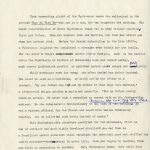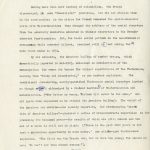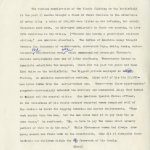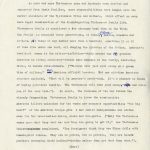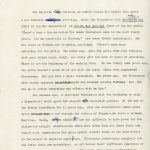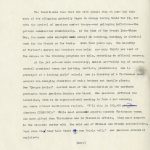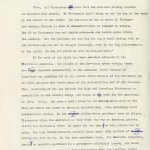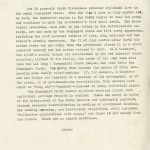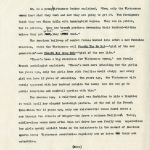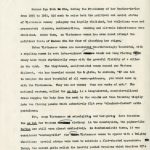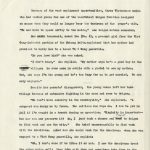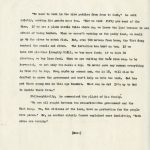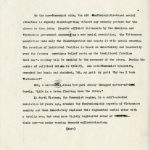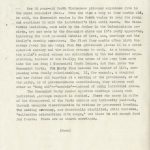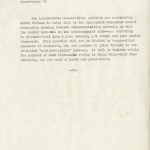1966, November 10, “Swirling Wartime Door for Vietnamese Women”
Saigon, Vietnam
November 10, 1966
Mr. Gerald Walker
Sunday Department
The New York Times
Times Square
New York, New York 10036
Dear Mr. Walker:
My apologies for sending this piece to you later than I promised; it became a much more vast and complex undertaking than I had at first envisioned. The piece is longer than you mentioned; I intentionally allowed some of the interview quotes to dwindle on so that you could get a better flavor of the situation, but they can be easily cut. If you want me to edit down the piece more, you might send me a cable and I’ll airexpress you a revised version within two or three days. My cable address: Deepn Saigon.
The piece is weak on statistical documentation–but this is the plight of Vietnam. The Ministry of Labor has yet to complete its 1965 statistical work, which includes breakdowns by sex; the Ministry of Health doesn’t know how many nurses–male or female–it has. However, the sweeping generalizatio[n?] of the statements is not questioned here. I interviewed three sociologists, all women–one American, one French and one Vietnamese–who provided guidance of judgement as well as some quotes; in addition, I have talked with many Vietnamese through the years which provided some of the more common details of their family life.
I am taking the liberty of enclosing a selection of photos, which are not exceptionally good, but might be useful for you.
Thank you for the initial request for this piece; I hope it proves satisfactory to meet your needs.
Sincerely yours,
(Miss) Beverly Deepe
Encl.
Beverly Ann Deepe
64A Hong Thap Tu
Saigon, Vietnam
November 9, 1966
SAIGON, VIETNAM.
The 44-year-old wife of a low-ranking Vietnamese government official recently visitedx the damp, cluttered office of a woman lawyer, explaining that in more that two decades of marriage she and her husband lived in a small House with maids and in-laws.
“But, now it is just too much,” she explained to them comm compassionate lawyer. “I can’t take it any more. In the past six years, my husband has not spoken a word to me–not a mortal word. I want a divorce.”
Several days later, at the same lawyer’soffice in downtown Saigon, a yloung housewife staunched through the door and also requested the initiation of divorce proceedings.
“After six months of marriage, my husband slapped me–and I refuse to tkake it,” T she explained vehemently. The woman lawyer, Mrs. Nguyen Thi Vui (Gaity (Gaity), confessing she felt more like “a psychiatrist,” forged a reconcialiation in both cases. She urged the older woman to have her hair bobbed, instead of wearing the old-fashioned bun, to replace her missing front teeth and to erect a small partition between her bedroom and the sleeping rooms of her in-laws to produce some intimate privacy. Mrs. Vui‘s formula was magical: for the first ever, the recalcitrant husband put his wife on the back of the family scooter, called at the lawyer’s office to thank her and to present her a gift of delicate fish sauce from the Mekong Delta.
(More)
Deepe
Women–page 2
In the second case, Mrs. Vui recalled that not onlyLong ago the “suffering” tradition of the Vietnamse wife was to kneel before her husband has he beat her with a rattan stick or feather duster; she then “tricked” the young housewife by telling her that indeed even Mrs. Vui–a prominent professional an man in Saigon–occasionally slapped her too.
Even the comp contemplation of a divorce suit epitomizes a miniscule facet in the galloping evolution of Vietnamese womanhood in a country in which only three years ago divorce was illegal except under special dispensation of Roman Catholic President Ngo Dinh Diem and his spitfire sister-in-law, Madame Ngo Dinh Nhu. The two prospective divorce cases illustrated the slow-motion equalization in the husband-wife relationship, which is the heart of the Vietnamese family, and which, in turn, is the stark quintessence of the nation-society. In the setpiece battles of the sexes, husband-wife entanglements commonly end up with barriages of fl dai bay–“flying saucers,” as vases, soup blow bowls or bamboo chairs are hurled into orbit. In other cases, the wife’s sphere of influence already dominates that of her husband’s in thehome, but unlike American wives,the Vietnamese wife in public still creates the appearance that her husband dominates.
One American advisor was flabbergasted that his counterpart, a Vietnamese province chief, consistently had to ask his f wife for two twenty piastres (about twenty cents) in order to get a haircut. One Vietnamese high-society wife gloated,”Maybe the Vietnamese generals and ministers run the country, but their wives run them.” One Vietnamese general once laughingly replied to a foreign correspondent’s question, “I’ll have to ask my own commander-in-chief.”
(More)
Deepe
Women–page 3
The wife of one Vietnamese colonel once organized the wives of hier husband’s subordinates into search squads to ferret out their husband’s when in “top secret conferences” with rival lovers. During the flaming Buddhist crisis in mid-1963, Madame Ngo Dinh Nhu jerked the linen tablecloth, which sent bowls of chicken soup flying into her husband’s face, when she deemed he had made too many concessions to the wily monks who were later to sparked the toppling of the regime. Even Prime Minister Nguyen Cao Ky and his lovely 24- 25-year-old wife are known to engage in shrill verbal battles when Mrs. Ky demands|to go to Kong Kong on extravagant shopping spres sprees and her husband refuses in the grounds that the Vietnamese po1/2u population would accuse her of smuggling gold and diamonds out of the country, as other top-level wives are criticized. Authoritative sources report that these bitter tiffs between the Prime Minister and his wife usually cause a flurry of official cables at the American Embassy.
If such marital battles are viewed as commonplace within the context of the full-fledged egalisation of the Western woman, in the non-Communist Orient, they are part of the so smouldering evolution of the emancipation of Vietnamese females, whose traditional heritage was Confucianistic since the first Chinese conquest of Vietnam in 111 B.C. While Confucius did not d codify a religion,— the teacher-scholar presumed the existence of God–he did establish a ritualistic code of ethics which would guarantee earthly politica political harmony by defining the five basic human relationships–king and subject, father and son, elder and younger brother, husband and wife and friend and friend.
(More)
Deepe
Women — page 4
Thet tormenting plight of the Vietnamese woman was epitomized in the proverb Thap Nu Viet Vo–one son is a son, but ten daughters are nothing. The moral indoctrination of every Vietnamese woman was to obey without question, first her father, then her husband when she married, and then her eldest son when her husband died. Before the French colonialism in the late 1800’s, a Vietnamese daughter was considered a stranger even within her own family. She was never a taught such srct secret family recipes, such as the medical cures for diphtheria (a mixture of rhinoceros horn and burned herbs), neck cancer (pulverized pearls) or pyorrhea (green snake poison and snakepork fat).
Child marriages were the norm; she often tended her infant husband. She could be sold as a concubine, or hired out by her father as a servant. “My own father was 111 and my mother 10 when they were married,” a 43-year-old Saigon scholar s explained recently. “But my father really loved my mother. He never took a concubine or second wife as his fortunteller advised. He was considered a revolutionary at the turn of the century Because He Cut off His Hair. He was a customs official for the French and could have become fabulously wealthy, but he collectted rice bowls instead of money.”
This Confucianistic structure prevailed for two millennia, first as one of earliest and most highly developed civilizations and then as a fossilized social structure which worshiped the ancestral past and stiffled any social movement–fromxnn rural to urban life, from one region to another, from one class or occupation to another. Yet, Vietnamese women were still less restricted than Chinese women; they never had their feet bond , for example. The twisted twict d deformation of the feet of Chinese grandmothers in Vietnam still show the effects of this Confucianistic practice. (More)
Deepe
Women–page 5
During more than half century of colonialism, the French discouraged, sh such “feudalistic” practices, but did not abolish them in the countryside; in the cities the French veneered the social-economic elite with Westernization; they changed the arbiters of the social structure from the scholarly mandarins educated in Chinese characters to the French-educated functionaries. But, the basic social pattern in the non-Communist areasxarexx while somewhat diluted, remained still in tact during their rule which ended in 1954.
By all accounts, the American buildup of combat troops, which dramatically impacted in mid-1965, unleashed an acceleration of the emancipation for women far beyond the wildest expectations of the Vietnamese, leaving them “dizzy and disoriented,” as one husband explained. The traditional slow-moving, nearly-petrified Vietnamese social structure lurched as though sidew d sideswiped by a violent hurricane of Westernization and modernization. (“For better or worse, Vietnam will never be the same,” one old Asian hand explained as he watched the American buildup). The weight of the American war machine–and equally important, the accompanying “green tide of American dollars”–produced a series of cross-currents unparalled in the preceding two thousand years–the results of which are still unkown and the end of c which is still not in sight. (“Twice in the past 1000 years we had such a imiraculous opportunity to make money,” one midd–le-aged businessman explained. “the first was the French war, but we were too young; the second is now. We can’t let this chance escape.”).
(More)
Deepe
Women–page 6
The vicious acceleration of the bloody fighting on the battlefield in the past 15 months brought a flood of rural families to the adventures of urban life; a total of 900,000 were listed as war refugees, but untold thousands more came, as wide-eyed immigrants in their own country, to live with relatives int he cities. (“Vietnam has become a giant-sized railroad station,” one American observed). The influx of American money brought demands for thousands of washer-women, shoe-shine boys, maids, cooks, entertainment ,And construction work,ers, which sommersaulted overnight Vietnam‘s chronic unemployment into one of labor shortages. Woman-power became an immediate substitute for manpower, which for the past two years had been bled white on the battlefield. The biggest private employer in Vietna, Vietnam, an American construction combine, hired half of his its 50,000-man labor force from the not-so-weaker sex. Women–even those eight-months’ pregnant–increasingly unloaded the military and commercial ships that docked in Saigon and the coastal cities. One American Special Forces officer, in the wilderness of his remote outpost reported women comprised half of the workers he hired for digging trenches and mortar emplacements. “They work harder than the men, but the men raise hell if we pay them the se same wages,” he confessed. “So, we have to pay the women about seventy percent of what we do the men.” While Vietnamese women had always done heavy manual and field work in the countryside, they did it alongside their husbands and children within the far framework of the family.
(More)
Deepe
Women–page 7
As more and more Vietnamese sons and husbands were drafted and separated from their families, more responsibilities were dumped onto the narrow shoulders of the Vietnamese wives and mothers, which effect an even more rapid acceleration of the disintegrating Vietnamese family life. Vietnamese family is considered a sfar stronger bond than in the West; the family is composed three generations, at times, plus uncles, cousins and in-laws. IAt times it may number more than a hundred; sometimes 15 or 20 of them live under one roof, all obeying the dictates of the father. America‘s deadliest enemy in the cities–inflation–which eroded any gun genuine increase in living standards–forced more members of the family, including wives, to become rice-winners. (“Vietnam will just roll along on a green tide of dollars,” oneAn American official boasted. But one old-time American resident exploded, “That will be America‘s death-wish. It’s a chimera to dream of buying political loyalty. The Vietnamese will take your money,xkit and curse you at the same time.”). In short, the violence of the war forced the already fragmenting Vietnamese family to leave the countryside; American dollars unleashed for the women new economic opportunities; “the big heart” of the American troops gave new social independence and status even for the lowest-class maids, cooks and bar-girls. (“Only the Vietnamese women know what they want and how they are going to get it,” one Vietnamese banker coplaine complained. “You foreigners think they are China dolls with hummingbird voices. They are in public, but in private, they are beserk panthers devouring their husband-victims unless they get what they want.”).
(More)
Deepe
Women–0gage page 8
The American builu build-up of combat forces has hurled into orbit a new feminine crwat, wh creation, which the Vietnamese call Phu-Nu The He Moi (Girl of the New Generation) or Phu-No Doi Song Moi (Girl of the New Life). “There’s been a big evolution for women throughout Asia in the past twenty years, but cx especially in Vietnam,” one woman French sociologist, who has lived in Vietnam for 18 years, explained. “There’s much more schooling for the girls; ten years ago, only the girls from rich families with good talent could study; now every girl can have 12 years of schooling. There is now the beginning of the working wife. In the family some years ago, the girls couldn’t speak to or sit with the boys; there were segregated classrooms. Now you have a rapid revolution. Ten years ago, the Vietnamese wife rarely appeared in publishnwith her husband outside thehome; now she can go to public receptions and affairs with hm him.”
Two decades ago, a well-bred Vietnamese girl was forbidden to ride a bicycle–it would spoil her elegant hed- head-high posture. At the end of the French Indo-China War 12 years ago, only one aristocratic woman dared drive through the a car through the streets of Saigon–she drove a crimson Cadillac. Today, chaufe chaufferrs are too difficult to hire (even for the diplomatic corps); middle-class women more often than not drive their own family car; upper-class bar girls openly solicit trade on the mainstreets in the newest of American sports|cars. Vietnamese secretaries regularly own and drive their own motorbikes, or sit behind their boyfriends (American or Vietnamese) swerving through the traffic with their legs so cgracefully poised they appear to be riding the winds.
(More)
Deepe
Women–page 9
In the|urban centers, even the relationship between the modern Vietnamese girl and her parents on the most fundamental question–her marriage–has evolved into a spin. In Saigon, for the generation of the grandmother, her marriage was arranged by her parents–at a sub-teen|age–and she was not permitted to refuse. The split-level generation of wives int heir thirties and forties would likewise have her marriage arranged by hertheir parents, but she could refuse a number of selections until she found one suitable for herself. This marital arrangement was made in a ril ritualistic ceremony at her parents’ house in which the future bride and groom sized up each other over a cup of tea. Today, however, the “new life” girl is free to choose her own husband; pre-mai pre-marital relations occur, but not frequently. Leading from Saigon to the northwest provinces, the four-lane, fluorescent-ligthed Bien Hoa Hiw Highway, built at a cost of US$66 million, is one of the most popular lover lanes for the teenage motor-scooter set from Saigon. They are often seen necking in the roadside coconut groves–or watching a portable television set while sitting on a rice paddy dike. While it is not uncommon for an upper-class family to assign a younger brother to chaperon his sister when she leaves the house, the youngsters simply form a common alliance and she runs off to see her momentary boy friend of the moment.
(More) (M
Deepe
Women–page 10
Many non-Catholic brides still choose to be married in a simple traditional wedding cerm ceremony, in which both bride and groom kneel prostrate themselves before the family’s ancestral altars inAnd gifts of lotus-scented tea and narcotic betel-nuts are exha exchanged between families and friends. But, long white Western satin-and-lace bridal gowns are becoming more popular, even among lower middle-class families. Mrs. Nguyen Cao Ky typified this nouvelle vague (new wave) when at her wedding freception in November, 1964, she wore an elegant white bridgal gown at one of the crowning social events in Saogn.Saigon. In the first wedding between a Korean soldier and a Vietnamese teenager, the bride wore a Western gown. In hamlets and villages, brides wear their best ao dai town gown; in Viet Cong controlled areas, the bride wears her best ba-ba, the pjama pajama-like costume of flowing pantaloons and long-sleeved bluous blouse. In the Viet Cong ceremony, there are no religious rites; the permission to a marry and the pronouncement of marriage is granted by the ranking pro-Communist political or military superiors. Viet Cong “godmothers” frequently serve cakes and candies to the new l newly-wed couple and their families at the wedding receit reception in their jungle strongholds.
(More)
Deepe
Women–page 11
In traditional times, themm more the children, the bigger the family joy. Today, Vietnamese wives are expressing more and more interest in various birth control methods. Even for the upper-class, “the pill” is still to expensive and has to be especially obtained from Hong Kong; American males have introduced it to their girl friends. One American official, however, was astonished when the wife of a Vietnamese province chief ina a remote area expressed interest in it. Other contraceptives are sold at the U. S. military exchange atAnd at the street-stall cigarette counters. Even when Madame Nhu banned the use of contraceptives before 1963, they were still sold clandestinely. They are widely used by bar-girls and by some of the Westernized elite. In the cities, abortions are expensive, but And common, though technically illegal. In the hamlets and villages, birth control is rarely used–and then the age-old method of separate beds.
Madame Ngo Dinh Nhu, during the presidency of her brother-in-law from 1955 to 1963, did much to raise both the political and social status of Vietnamese women–but still in more moder f moderate fashion than the Communists. Pologamy was legally abolished, but violations were not prosecuted. In one extreme example in 1962, a Vietnamese mechanic, a well-paying skilled job in Saigon, continued to live with his seven wives and 49 children–all under one roof in a seven-room house. Her organization of a reported one-million women did little to wield the government closer to the rice-roots level of the countryside; but it did provide the social pretext for teachers, wives of government officials and officers to get to know each other in the provincial cities. With the fall of the Diem regime in 1963, the organization immediately crumbled; in the provincial cities, the government wives, though they had little fondness for Madame Nhu–did complain about the soc social vacuum created with the demise of the organization. Since then, no Vietnamese woman has even dared attempt the political feats of Madame Nhu for fear of absorbing her stigma. (More)
Deepe
Women–page 12
The evolutionary process has manifested itself in the exterior of the urban Vietnamese, who are considered brreath breath-takingly beautiful, with a rippling comma in each lotus-colored cheeck and long flowing back black hair which rhythmically sways with the fra graceful fluidity of a willow in the wind. The tiny-boned, small-waisted women caused on Western diplomat, who has traveled around the globe, to exclaim, “These are really the most beautiful creatures in the world. If one had to imagine the most beautiful of all women-goddesses, you would come up with the Vietnamese. They are not women; they are a works of art.” The national costume, called the ao dai (pronounced oh ow diezie), is a long-sleeved, mandarin-collared dress hugging the body from the neck to the waist and then breaking wispily into two flowing panels which seductively flit over “eleg “elephant-footed” satin pantaloons. Though some Vietnamese women accuse an 18- 18th-century Dior of designing the dress as a mean for French textile merchants to sell more material, the couture is a splin splendid match for the diminutive Vietnamese figure.
9(More
Deepe
Women–page 13
Yet, many of the Vietnamese schoolgirls–and more significantly, the bar-girls,–have forsaken the ao dai for Western clothes. in t the o countryside, ba-bas are worn exclusively. The traditional high-heeled, toe open-toed wooden sandals of painted with lacquer have given way to lowcut sling pumps for the modern girls. In traditional times, it was “contemptible” for a Vietnamese woman to appear with a bulging chestline; special straps were worn to maintain a flat-chested appearance. Today, not only the modern girl–but also the wives of upper-class families–relish the heavily padded versios versions which American GI’s have jokingly termed “Hong Kongs”, because they are not indigenous to Vietnam. Today, the new beatu beauty status symbol is plastic ser surgery on the breasts, the unslitting of the almond-like yes eyes and the “straightening” of the noses, since a Vietnamese characteristic is to lack a bridges in their noses. Mrs. Ky had An eyes and nose operation of this kind in Japan before her marriage.
Before World War II, almost all Vietnamese women wore the traditional hair-style of turbanning their hair around their head in a lazy coil, like that of ad drunken cobra. During the Japanese occupation of the country, a few urban women cut their hair short as a matter of convenience. Today, in both Saigon and the provincial capitals permanent waves or high-styled beehives are popular; even peasant girls in the Viet Cong wear short curly hair.
(More)
Deepe
Women–page 14
While middle and upper-class wives in the urban centers can buy a simple dress without their husbands consent, the style of the clothes is often a matter of intense debate. In Saigon recently, the wife of a middle-class accountant–and the mother of three children–began to work as a cashier ina a neighborhood bar as a means to add income to combat inflation. To his astonishment, the husband returned one day to find his wife wearing pedal-pushers and a beehive hair-do, which the Vietnamese call “the Birmingham Palace Guard upsweep.”
“What do you think you’re doing,” the husband ranted. “You belong to a traditional family. Why do you have your hair combed like that–you look like a whore.”
The|wife retorted, “I have to wear this to look presentable for my job. What do you care–the kids are better dressed and I make more money than you do.” The wife won the argument, but the husband made the last threat, “if you don’t behave well, I’ll take the children and leave the house.” In another case, one husband used to threaten his second wife that if she didn’t behave well, he would marry a third. Today, the wife maintains the family by selling diamonds, leaving her husband home to do the laundry and take the children to school. She now threatens him to gthat if he doesn’t treat her well, “I’ll marry an American. I’m still prettier than a bar-girl.”
(More)
Deepe
Women–page 15
The traditional view that the wife should stay at home and take care of the offspring gradually began to change during World War II, but with the arrival of American combat troops–and galloping inflation–the pattern accelerated dramatically. At the time of the French Indo-China War, few women were employed and except in teaching, nursing, or clerical work for the French or the banks. Even four years ago, the majority of Vietnam‘s nurses and teachers were male; now only thirty per cent of the nurses in the training programs are male, according to official sources.
At the jet set–or more accurately, Dakota set–elite top of society, several prominent women are doctors, dentists, pharmacists; one is principal of a leading girls’ school; one is director of a Vietnamese bank; several are managing directors of radio battery and textile plants. Two “Dragon Ladies” control most of the construction in the northern provinces where American Marines are based. One American official was astonished, when in an organizational meeting to form a new company, one woman without hestitation replied, “I’ll chip in 100,000 piaastres piastres (US$1000).” While most economic experts concede Vietnamese women are more gifted than Vietnamese men in financial affairs, they must compete in the economic sector with the male sex of Chinese and Franch nationalities, “and even theyn they hold their onw own fairly well,” one American economist explained.
(More)
Deepe
Page Womne–page 16
The upper-elite of Saigon and other uba urban centers–the families of doctors and dentists, or successful businessmen–un considered themselves under the Diem regime as the social arbiters of the country, because of the old Confucianistic status placed on education. But, with the move of the Vietnamese military juntas into the political domain since 1963, the educated elite has eclipsed in their privileged decision-making importance. Not without some justification, Vietnamese generals have publically acus accused this educated elite of doing little to support the anti-Communist war effort, while they consistently snippily criticize the government.
The life in this small btracket of elite at the top fo of the Vietnamese social pyramid is cocooned in elegance and luxury. Many own barn-like villas in the old “French Quarter” of the city. They are at least a one-car family (chauffeured), and often a two-car family; they often own either a black Mercedes or an older model of a flashy American car. Their sons and daughters attend the elite French grammar and high schools in the country and become “awkward Frenchmen,” speaking better French than Vietnamese; knowing more about French history, and geography geography and literature than that of their own birthplace. Many of these children–especially sons–are wisk whisked out of the country before they are eligible for the military draft; many study in Paris–and in American on American-government scholarships–and some seldom return to their homeland. (More)
Deepe
Women–page 17
GTheir homes are decorated with such modern luxuries as air-conditioning in the bedrooms, stereo tape recorders in the living room. And, in addition, the posses the most ancient convenience in the Orient–servants–who are a combined baby-sitter, maid, automatic dishwasher, cook, wa And laundromat. In this urban elite, the families in which the husband and wife are older than 40 are dim carbon-copies of the old French cultural tradition–“they are just chocolate Frenchmen, being more French than the French,” one Westerner observed. In thier homes, a seven-course candlight dinner of French cuisine, capped by champagne, for as many as 20 persons is not uncommon. All are discreetly anti-American in their political views and cultural prejuidices . The younger elements in this Westernized elite–younger than 400— are often more Americanized than Frenchified.
“Since the French-Indo-China War, there has been a big difference, even between my grandmother and myself,” one 39-year-old wealthy, and highly educated Saigon housewife explained. “My grandmother was stricter; she had three girls and t wanted them to get married young. When my mother married my father, I was the only child and my mother always wanted me to be someone. She wasn’t happy in her marriage because it was an arraged arranged one. Vietnamese women used to were submissive; there was no divorce; it was her l lift lifetime responsibility to serve her husband. My mother wanted me to be different; to have a higher education which she couldn’t have. She wanted me to go to America or France to study–and I did.
(Moree)
Deepe
Women–page 18
“She allowed me to be free, except for one thing–love. She didn’t want me to marry young, being afraid I would be unhappy. Though she was liberal, she didn’t let me have any boy friends, even when I was 15 or 16. She d did allow male tutors to come to teach me English, Chinese characters and how to play the mandoline and guitar. But, she always watched what I did in the big mirror in the hallway. Of course, when I was a teenager, I wanted to be admired and I like to flirt; I read French novels about girls and boys. My mother sploiled me, but then built fences around menx when it came to boys.
With joyful reminesces reminiscences, the young housewife, continued: “My mother always told me boys weren’t nice and would take advantage of me. If I went to m the movie or market, there was always someone trailing me. One boy wanted to marry me–he’s now a general–but my mother wouldn’t allow it. ‘He’s just a weak, noodle type,’ she told me. My mother tried so hard to make me s9omeone–not simply a woman–but someone.
“I wanted to be beautiful; though we had money, my mother didn’t want me to waste it. The day I left for study in France, I had only 7 Vietnamese dresses and 10 suits. My mother said, ‘It’s enough’.“
“I said, ‘It’s not enough. Someday, I’ll have 100 beautiful dresses’. Mother m said, ‘fine–but now you do what I want you to do!”
“I suppose she succeeded. I married for love; my husband is kind and well-off; we have four lovely children–and yes, I have the 100 beautiful dresses my mother wouldn’t let me have twenty years ago.“
(More)
Deepe
Women–page 19
“Now, all Vietnamese knw know that our national destiny depends on international events. We Vietnamese don’t think we are the top of the world or the center of the world; the question of war or peace in Vietnam–and whether Vietnam is free or Communist–will be decided by others. But if we Vietnamese can not decide peace–we can decide order within the society. But the problems are too big for us, a small nation with an old culture–we can not be changed overnight, even by the big policy-makers of the world. No one yet knows we will be changed into.”
If the role of the elite has been somewhat eclipsed by the BVietnamese generals, the plight of the low-class urban working woman has impor improved considerably in the economic field because of boom-time war spending and in the social field because of the courteous way in which American men treat women of all nationalities and of all classes. This narrowing of the gap between the high and low-class Vietnamese is exemplified by one elderly maid, who began to wro work for the Americans in 1964. Today, she owns a small house in the Mekong Delta city of Can Tho and rents two rooms to American enlisted men, thus achieving lower middle-class status. In one midd-el middle-class apartment area in Saigon, Vietnamese wives are entranced as they watch the way an American private treats his Vietnamese wife; he opens the car doors|for her, allows her to enter the taxi before himself, carries their small baby instead of hiaving having his wife do it. In the same apartment area, two American sergeants, renting an upstairs apartment in a government officials’ housek, pay their cleaning-laundrywoman more and treat her better than the landlady treats her servants–eventually the landlady began to l treat her maids better.
(More)
Deepe
Women–page 20
Because of the vast employment opportunities, three Vietnamese maids who had worked years for one of the wealthiest families in Saigon resigned en masse when they could no longer bear the tantrums of the owner’s wife. “We now have to speak softly to the maids,” one Saigon matron conceded.
One maid, named Sau (No. 6), a peasant girl from the Viet Cong-infested portion of the Mekong Delta explained that her mother had promised to marry her to the local Viet Cong guerrilla.
“Do you love him,?” she was asked.
“I don’t know,” she replied. “How can I love him? My mother says he’s a good boy in the village. He came once in awahile with a pistol to see my mother. He should be important because he wore a pistole; most of the guerrillas weore rifles.”
She was asked why she didN didn’t did not marry him.
“My mother says I’m too young and he’s too busy,” the 16-year-old maid explained. “We’re only engaged.”
Despite her parents’ disapproval, the young woman had left her home village because of extensive fighting in the area, and then came|to Saigon.
“We can’t have security in the countryside,” she explained. “theA sergeant can marry me by force. The soldiers can rape me. I can be put in jail if I’m caught in a trench during an operation. Virginity is important–but how can one preservie it? So, I just took a chance to come to working in Saigon and to see the city.”
(More)
Deepe
Women–page 19 21
Unhappy working for the middle-class Vietnamese family, she tried to work for the Americans, but lacked the proper connections to get a job. Asked how she could work for the Americans when she was a engaged to a Viet Cong guerrilla, she replied:
“Oh, I don’t care if he likes it or not. The Americans treat others well. I saw how the American treat the other maids; they joke with their maids and sometimes take them to the movies or give them candy for their children.”
Another 17-year-old maid, from the Communist-infested province of Quang Ngai defiantly recited Viet Cong poems around the house of the middle class family she worked for in Saigon. A former fish-peddlar, she was asked about the American troops.
“Yes, the Viet Cong say Americans are evil,” she replied. “The Viet Cong say the Americans eat people–that they open up the abdomens of people and take out the people’s liver and eat it. But that’s not true. The Americans eat canned food only. I see alot of empty cans at the rubbish heap.”
She was asked if she like the Americans.
“I don’t hate the Americans,” she replied. “I would never marry one–if I went back to Quang Ngi Ngai, the people would criticize me and say I was a prostitute. But, I like the way the Americans treat their maids–they treat them much better than the Vietnamese treat theirs. That’s real democracy.” The Vietnamese word for democracy is “Dan Chu”, which means literally, “People is the boss.” The Saigon government dcscribes describes its superior relationship to the peopole in the phrase Phu Mau Chi Dan–the government is the parents of the people.
(MORE)
Deepe
Women–page 22
A violent tornado of female social mobility was unleashed for the bar girls, hostesses and prostitutes, the soc so-called “Sin-Dolls” and “Night-faces” which blossomed around each American cantonment. While the social plight created a political furor inteernally within Vietnam, and created a political-social eyesore, in which downtown Saigon became a street of “cheap drinks and cheaper women.” Despite the moral And Political considerations involved, the economic ladder enabled illiterate women for the countryside and the city slums to become the supporters of their families and to become the walking exponent of Americanization.
“Maids and country girls go into prostitution not simply because they need money,” one Vietnamese sociologist replied. explained. “Deep inside, they want to get outside their own environment and to be something else–rice someone else. They’ll no longer be happy as servants or pineapple-sellers.”
One|Vietnamese mother of three, abandoned by her Chinese husband, began working as a bargirl in 1963 as the American advisory effort mushroomed. And, in one year, she saved the enormous sum of 500,000 piastres (roughly US$5000). Today she owns the bar.
“If I married a Vietnamese now, he would beat me,” she explained. “And he wouldn’t let me work in the bar. Since I’ve been married, I’ve already lost my virginity. Now, as a bar owner, no one looks down on me; I own a car, house and stereo set. my children are well-fed and attend the best private French school in town.
(More)
Deepe
Women–page 23
“Now, when people come in and have a drink, they have to be courteous to me. This is better than the old tradition of being a coof fo cook for a husband that beats you–or better than keeping your virginity. I doubt that virginity matters any more. Now everyone treats me like a princess.”
Leaving Saigon or any o major urban center, the sociological landsac landscape, only minutes from the city limits, jumps backwards into a time frame several centuries old. While in the urban centers, time moves quickly–“what happens in most countries in a century happens in a year in Vietnam,” one Saigon politician once observed. But, in the countryside, time seltp slept for centuries, bringing little change. Between the cities and the countryside, there is no suburban bridge; while Western press dispatches commonly refer to suburban areas, these are little more than semi-skilled urban workers living in rural rice-straw houses.
Only five miles from Saigon, in the village of An Ph7 Phu, this correspondent interviewed one peasant family, the lowest of the three classes in each Vietnamese village. The upper village class is composed of the rich landowners, who do little of thieeir own farm work, and the rich businessmen, such as the rice-miller. These often lifve in masro masonry villas; they served both the French and American interestes during Vietnam‘s two wars. The middle class, who live in wooden houses, own their farm land and sometimes have a surplus to rent to tenants. But the lowest class, such as the Dung family, live in a house made of thatch roof, palm-leaf siding, and hard-packed mud floors–the duplicateReplica of the houses of their forefathers for a thousand years. They are the|farm tenants and laborers; many American officials suspect this class on the whole serves the Viet|Cong Communists.
Deepe
Women–page 24
In An Phu (pop. 2161), each thatch-roofed house has its own trench, generally under the large wooden family bed. Generally they the trench is surrounded by a thick, three-–foot high mud dike. This trench may have saved the life the Mr. Dung this falon the autumn on the day his son was killed only thirty meters from his front-door.
“My wife got up early to go to the rice field at 6 a.m.,” Mr. Dung explained, twisting his long wispy white beard and tucking his barefeet under the bamboo stool.” I gppt got up to fix breakfast for the children and grandchildren. Then the firing started and we all got under the bed. One bullet came into the house, sped through the|curtain and hit the mud dike and piece of dirt flew into my soup.
“Then I was afraid that the American planes would come and bomb the Viet Cong and would set the whole village on fire. So, I took the children and grandchildren to the mainstreet of the village. Then one of the villagers came up and told me the news: my son was dead, when thea Viet Cong company wiped out the government platoon of government militamen militamen (14 men). When I went to find my son, he was only only thirty meters from our home. Half of his body was on the high ground and the other half was in the mud.”
Summing up the battle in which a Viet Cong company wiped out the militamen , the old father continued stoically, but simply,” It is tragic to see the dead.” (More)
Deepe
Women–page 25
The war had hurt his family in other wasy ways. In 1963, under the old strategic hamlet program, he had been ordered to move his home along the main highway artery; in this new village he became a farm laborer, rather than a tenant. The lack of security affect his work.
“We used to work in the rice paddies from dawn to dark,” he said quietly, serving his guests more tea. “Now we work fifty per cent of the time. If we see a plane circle above us twice, we leave the land because we are afraid of being bombed. When we werent’t working on the paddy land, we could go to the river to catch fish. But even 700 meters from here, the Viet Cong control the canals and river. The inflation has hurt us too; the price of food is more expensive. If we have 100 piastres (roughly US$1), we buy more food; if we have eighty 80 piastres, we buy less food. When we are waiting for the rice crop to be harvested, we eat only two meals a day, but when we are working in the fields we eat three meals a day. We never save any money; everything is from day to day.”
His mind was filled with questions without answers. Would the family receive the one year salary of his dead son, as the government regulations provided? (“The government is very bad about pay us what is our due.” Would his 18-year-oldsecond son, 18-years-old, be allowed to stay in the village and help support the family, or would he too be drafted to serve the government? (“God has put these young men in this age bracket,” he observed. “What can we do? It’s up to God to decide their fate.”).
(More)
Deepe
Women–page 26
Philosophically, he sumar summarized the|plight of his family.
“We are all caught between two crossfires–the government and the May Ong (“those moisters”–er referring to the Viet Cong). We, the citizens of the land, have no protection from the peo0ple with power; anyone can blame us.” Or, as another elderly famr farmer explained more incisively, “Both sides are vermin.”
On the non-Communist side, the old Confucianistic-based social structure is rapidly disintegrating without any new organized pattern for the pieces to drop into. Despite official statements by the American and Vietnamese governments announcing a new social revolution, the Vietnamese see only the disintegration and equate it with social anarchy. The reaction of individual families is based on uncertainty and insecurity over the future; sometimes believef rests on the traditional fatialism that one’s destiny will be decided by the o movement of the stars. During the political series of political crisees in 1964, one anti-Communist housewife, wrenched her hands,cried, and shrieked, “Oh, my god! my god! What was I born Vietnamese?”
But a lower-class bar-girl simppl simply shruggede matter-of-factly, “Life is a lotus floating down the river–sometimes hitting bad storms, se sometimes gliding smoothly.”
But, in North Vietnam, the Communist regime, in asw swift-stroked revolution 12 years ago, crushed the “feudal” Confucianistic aspects of Vietnamese society and then immediately replaced this regimented social order with a totally new, but even more tightly regimented order of their own, a social order veering toward collectivization.
Deepe
Women–page 27
One 26 year-old North Vietnamese prisoner explained live in the rural Communist state. From the tijme a baby is four months old, he said, the Communist regime in the Notrth begins to rear its young and continues to mold the individual’s life until death. The dicatorial decisions, once made by the father in the Confucianistic society, are now made by the Communist state and it’s party apparatus, including the most personal details of love, sex, marriage and the family’s worship ancestors. The first four months after birth the mother feeds the new baby; then the government places it in a state operated nursery and the mother returns to work. As a teenager, the child’s social values are established by the Red Kerchief organisation, instead of the family; the cream of the crop then move into the Lao Dong (Communist) Youth League, and then later the Communist Party. Thhe pParty then becomes the center of life, surpassing even family relationships. If, for example, a daughter and her father sit together at a meeting of the government, or of the party, or of government, or of the party, or of government-run associations, they address each other as “dong chi”–“comrade”–instead of using individual names.
The Communist Party member approves marriage plans; each individual ,arriage request is studied. Those who marry in spite of the disapproval of the Party members are indirectly punished, through economic discrimination in rations or government housing. The wedding ceremony, now drastically simplified, still includes, “collective celebrations with songs,” but there is not enough food for feasts. There are no church marriages.
(More)
Deepe
Women–page 28
The imponderable non-military question now conferonting S South Vietnam is this: will be the regimented Communist social revolution weering towards collectivizsation prevail; or will the social uphealval on the non-Communist side–now orbitting in mid-air–fall into a more orderly, yet modern and just social framework. This question will not be dicided by tough-willed generals or ministers, who now presume to guide Vietnam in its so-called “nation-building” process. It will be decided within the context of each Vietnamelcse family by those China-dolls Cinderellas, who are made of steel and grief-tears.
-30-
Second Draft
In her initial letter to her editor, Keever explained she would be willing to revise and shorten this article if needed. It’s clear the editor suggested she tighten a few screws; this second draft is nine pages shorter than the original. Her talent as a journalist shows in that, though this article is significantly shorter, it looses none of the facts or emotions of the lengthier one.
The bulk of the editing can be noticed in the first few pages of the second article. Keever elected to take out the story of the second housewife from page one, and instead mentioned the crux of that story–that for years, domestic abuse was culturally accepted–at the top of page three. Other small changes can be spotted throughout the article.
Beverly Ann Deepe
64A Hong Thap Tu
Saigon, Vietnam
November 10, 1966
Women–lpage 1
SAIGON, VIETNAM
The 44-year-old wife of a low-ranking Vietnamese government official recently visited the damp, cluttered office of a woman lawyer, explaining she had been married for more than two decades. “But, now it is just too much,” she exclaimed. “In the past six years, my husband has not spoken a word xo to me–not a mortal word. I want a divorce.” The compassionate woman lawyer succektd succeeded, however, in forging a reconciliation; she urged the distraught woman to have her hair bobbed, instead of wearing the old-fasioned old-fashioned bum bun, to replace her missing front teetH and to erect a small partition between her bedroom and the sleeping rooms of her in-laws to produce some intimate privacy for her husband. The formula was magical: for the first time ever, the recalcitrant husband put his wife on the back of the family scooter, visited the lawyers lawyer’s office to thank her and to p resent her a gift of aromic fish sauce.
(More)
Deepe
Women–page 2
Even the contemplation of a divorce suit epitomizes a miniscule facet of the galloping evolution of Vietnamese womanhood in a country in which only three years ago divorce was illegal except under special dispensation of Roman Catholic President Ngo Dinh Diem and his spitfire sister-in-law, Madame Ngo Dinh Nhu. The prospective divorce case illustrated the slow-motion equalization in the husband-wife relationship. In the setpiece battles of the sexes, husband-wife entanglements commonly end up with barriages of dia bay–“flying saucers,” as vases, soup bowls or bamboo chairs are hurled into orbit.
In other cases, the wife’s sphere of influence already dominates that of her husband in the home. One American advisor a was flabbergasted that his counterpart, a Vietnamese province chief, consistently had to ask his wife for twenty piastres (about twenty cents) in order to get a haircut. One Vietnamese high-society wife gloated, “Maybe the Vietnamese generals run the country, but their wives run them.” Even Prime Minister Nguyen Cao Ky and his lovely 25-year-old wife are known to engage in verbal battles bitter enough to cause a flurry of official cables at the American Embassy.
If such marital battles are viewed as commonplace within the context of full-fledged egalisation of the Western woman, in the non-Communist Vietnam, they are part of the smouldering evolution of the emancipation of the female, whose traditional heritabge was Confucianistic since the first Chinese conquest of Vietnam in 111 B. C. Within the Confucianistic code of ethics, the tormenting plight of the Vietnamese woman was epitomized in the proverb Thap Nu Viet Vo–“one son is a son, but ten daughters are nothing.” (More)
Deepe
Women–page 3
The moral indoctrination of every Vietnamese woman was to obey without question first her father, then her husband, then her eldest son when her husband died. Often, she would be ordered to kneel in front of her husband as he beat her with a rattan stick or feather duster. Child marriages–even at 10 years of age–were the norm; her father could sell her as c a concubine, or hei he hire her out as a servant. “My own father was 11 and my mother was 10 when they were married,” a 43-year-old Saigon schoolar explained recently. “But my father really loved my mother. He never took a concubine or second wife as his fortunteller advised. He was considered a revolutionary at the turn of the century because he cut off his long hair, wyhich Vietnamese men then wore in a bun.” this Confucianistic structure–which later became fossilized–prevailed for two millennia; French rule for more than 90 yearsalmost a century did little to change these practices in the countryside, although the French veneered the social-economic urban elite with Westernization. Even under the French, the traditional view that the wife should stay home and take care of the offspring and the rice planting prevailed in the countryside; in the cities only a few women were employed, and then either in nursing, teaching or clerical work.
By all accounts, the American build-up of combat troops, which dramatically impaced impacted here in mid-1965, accelerated the emancipation of women far beyond the wildest expectations of the Vietnamese, leaving them “dizzy and disoriented,,” as one husband explained. The weight of the American war machine–and equally important, the accompanying “green tide of American dollars”–produced a series of exploding cross-currents unparalleled in the preceeding two thousand years—, the results of which are still unknown and the end of which is still not in sight.
(More)
Deepe
Women–page 4
First, the vicious acceleration of the bloody fighting in the countryside in the past 15 months brought a flood of rural families to the adventures of urban life; a total of 900,000 (most of them were women and children) were listed as war refugees, but untold thousands more came, as wide-eyed immigrants in their own country, to live with relatives in the cities. (“Vietnam has become a giant-sized railroad station,” one x American observed.) Second, America‘s deadliest enemy in the cities–inlfation–which eroded any genuine increase in living standards, forced more women to become rice-winners. Third, American troops and money brought both the demand and the notion monetary magnet for hundreds of thousands of housemaids, cooks, construction workersx and entertainers, which sommersaulted overnight Vietnam‘s chronic unemployment into one of a labor shortage. Woman-power became an immediate substitute for manpower, which had been bled white on the battlefield. Vietnamese women began to assume more and more responsibilities for the family both inside and outside the home as Vietnamese family life continued its rapid disintegration. The Vietnamese family–including uncles, cousins, and in-laws of two or three generations–often number more than one hundred. The strong ties among family members was the heart of the old Confucianistic structure; the individual had first to fulfill the obligations to the family group and then to the wider community of the village; today, this pattern is being blown to the winds. ( “Fore better or wiorse, Vietnam will never be the same,” one long-time resident explained as he watched the American buildup.“. (More)
Deepe
Women–page 5
Or, as a young|Vietnamese banker explained, “Now, only the Vietnamese women know what they want and how they are going to get it. You foreigners think they are China dolls with hummingbird voices. They are in public, but in private, they are beserk panthers devouring their husband-victims unless they get wantwhat they watn. want.”
The American build-up of combat forces hurled into orbit a new feminine creation, which the Vietnamese call Phu-Nu The He Moi–“girl of the new generation”–or Phu-Nu Doi Song Moi–“girl of the new life.”
“There’s been a big evolution for Vietnamese women,” one female French sociologist explained. “There’s much more schooling for the girls; ten years ago, only the girls from rich families could study; now every girl can have 12 years of schooling. Ten years ago, the Vietnamese rarely appeared with their husbands outside the home; now she can go to public receptions and cocktail parties with him.”
Two decades ago, a well-bred girl was forbidden to ride a bicycle; it would spoil her elegant head-high posture. At the end of the French Indo-China War 12 years ago, only one aristocratic woman dared drive a car through the streets of Saigon–she drove a crimson Cadillacc. Today, middle-class women more often than not drive her own family car; upper-class bar girls openly solicit trade on the mainstreets in the newest of American sports cars; Vietnamese secretaries regularly own or drive thr their own motorbikes.
(More)
Deepe
Women–page 6
In the urban centers, even the relationship between the modern girl and her parents on the most fundamental question–her marriage–has evolved into a spin. Traditionally, the marriage of Vietnamese grandmothers was arranged by her parents and shethey could not refuse; Vietna the marriage of Vietnamese wife wives in their thirties was also arranged, but shethey could refuse a number of selections until she found oneA suitable for herself.one Appeared. This marital arrangement was made in a ritualistic ceremony in which the future bride and bridgegroom sized up each other over a cup of tea. Today, however, the “new life” girl is free to choose her own husband; pre-marital relations occur, but not frequently. Leading from Saigon to the northwestern provinces, the flour four-lane, fluorescent-lighted Bien Hoa Highway is one of the most popular lover lanes for the Saigon‘s teenage motor-scooter set. They are often seen necking in the roadside coconut groves–or watching a portable television set while sitting on a rice paddy dike.
In traditional times, the more children, the bigger the family jow joy. Today, Vietnamese wives are expressing more and more interest in various birth control methods. Even for the upper-class, “the pill” is still too expensive and has to be especially obtained from Hong Kong; American males have introduced it to their girl friends. Other contraceptives are sold at the American military exchange and at the street-stall cigarette counters. They are widely used by bar-girls and by some of the Westernized elite; abortions are expensive, but common, though technically illegal. In the hamlets and villages, birth control is rarely used–and then the age-old method of separate beds. The Communist Viet Cong are opposed to birth control, arguing they need more human resources.
Deepe
Women–page 7
Madme Ngo Dinh Hu Nhu, during the Presidency of her brother-in-law from 1955 to 1963, did much to raise both the political and social status of Vietnamese women; pologamy was legally abolished, but violations were not prosecuted; divorce, contraceptives, dancing and all-male inheritances were abolished. Since then, no Vietnamese woman has even dared attempt the political feats of Madame Nhu for fear of absorbing her stigma.
Urban Vietnamese women are considered breath-takingly beautiful, with a rippling comma in each lotus-colored cheak e cheek and long flowing black ebony hair which rhythmically sways with the graceful fluidity of a willow in the wind. The tiny-boned, small-waisted women caused one Western diplomat, who has traveled around the h globe, to exclaim, “If one had to imagine the most beautiful of all women-goddesses, you would come up with the Vietnamese. They are not women; they are works of art.” The national costume, called the ao dai, is a long-sleeved, mandarin-collared dress hugging the body from the neck to the waiste and then breaking wispily into two flowing panels which seductively flit over “elephant-footed” satin pantaloons.
Yet, many Vietnamese sh schoolgirls, and bar-girls, have forsaken the ao dai for Western clothess; clothes; in the countryside, the pajama-like ba-bas are still worn almost exclusively. In Confucianistic times, it was considered “contemptible” for Vietma Vietnamese women to appear with a bulging chestline; special straps were worn to maintain a flat-chested appearance. And Today, the modern girls relish the heavily padded versions which American GI’s call “Hong Kongs” because they are not indigenous to Vietnam. The newest beatu beauty status symbol is plastic surgery on the breasts, the unslitting of the almond-like eyes and the “straightening” of the nose. Mrs. Ky had an eye and nose operation of this kind in Japan before her marriage.
(More)
Deepe
Women–page 8
While Vietnamese urban wives can buy a sm simple dress without their husbands consent, the style of the clothes is often a matter of intense debate. In Saigon, the wife of a middle-class accountant–and the mother of three children–began to work as a cashier in a neighborhood bar as a means to combat inflation. One day her husband returned to find his wife wearing pedal-pushers and a beehive hair-do, which the Vietnamese call “the Birmingham Palace Guard upsweep.”
“What do you think you’re doing,” the husband ranted. “You belong to a traditional family–but you look like a whore.”
The wife retorted, “I have to wear this to look presentable for my job. What do you care–the kids are better dressed and I make more money than you do.” She won the debate.
The jet set–more more accurately, Dakota set–contains a number of prominent women doctors, dentists, pharmi pharmacists in Saigon; one is woman is principal of a leading girls’ school; another is director of a bank; several are managing directors of radio battery and textile plants; two so-called “dragon laieds ladies” control most of the construction in the northern provinces where American Marines are based.
(More)
Deepe
Women–page 9
Life in the small bracket of educated elite at the top of the Vietnamese social pyramid is cocooned in elegance and luxury. Many of these families own barn-like villas in the old “French Quarter” of Saigon. They are at least a one-car family (chauffeured), and often a two-car family, usually owning either a black Mercedes or a flashy American car. Their sons and daughters attend the elite French schools and become “awkward Frenchmen,” speaking better French than Vietnamese. Many of the sons are whisked out of the country before they become eligible for military draft. Their homes are decorated with such modern luxuries as air-conditioning in the bedrooms, sterieo tape recorders in the living room; in addition, they possess a bevy of the most ancient convie conveniences in the Orient–servants–who are a combined baby-sitter, automatic dishwasher, cook and laundromat. In this urban elite, the families in which the husband and wife are older than 40 are dim carbon-copies of the French cultural tradition–“they are just chocolate Frenchmen, being more French than the French,” one Western observed. A seven-course candlelight dinner of French cuisine, capped by champagne, for as many as 20 persons is not uncommon. All are discreetly anti-American in their political views and cultural prejudices. The younger elements in this\Westernized elite–younger than 4030–are m often more Americanized than Frenchified.
(More)
Deepe
Women–page 10
“Since the French Indo-China War, there has been a big difference, even between my grandmother and myself,” one wealthy aristocratic, American-educated Saigon housewife explained. “My grandmother was stricter; she had three girls and wanted them to marry young. When my mother married my father, I was the only child. She wasn’t happy in her marriage because it was an arranged one. My mother wanted me to be different and have a higher education which she couldn’t have. She wanted me to go to American or France to study–and I did.
“She allowed me to be free, except for one thing–love. She didn’t want me to marry young, being afraid I would be unhappy. Though she was liberal, she didn’t let me have any boy friends. She did allow male tutors to come to teach me English, Chinese characters and how to play the mandoline. But, she always watched what I did in the big mirror in the hallway. She always told me boys weren’t nice and would take advantage of me. If I went to the movie or market, there was always someone trailing me. One boy wanted to marry me–he’s now a general–but my mother wouldn’t allow it. ‘He’s just a weak, noodle type,’ she told me. She spoiled me and then put fre fences around me. She tried so hard to make me someone–not simply a woman–but someone.
“I wanted to be beautiful; though we had money, my mother didn’t want me to waste it. The day I left for study in Fre France, I had only seven Vietnamese dresses and ten suits. My mother said it was enough. I said it’s not enough; ‘someday I’ll have 100 beat beautiful dresses’.
(More)
Deepe
Women–page 11
“I suppose she c succeeded. I married for love; my husband is kind and well-off; we have four lovely children–and yes, I have the 100 beautiful dresses my mother wouldn’t let me have twenty years ago.”
On the political situation, she explained, “Now, all Vietnamese know that our national destiny depends on international events; the question of war or peace–and whether Vietnam is free or Communist–will be decided by others. But, if we Vietnamese can not decide peace–we can decide order within the society. Still, the problems are too big for us, a small national with an old culture–we can not be changed overnight, even by the big policy-makers of the world. No one yet knows what we will be changed into.”
At the other end of the urban spectrum, the plight of the low-class working woman–now far more important numberic numerically–has improved considerably bec in the economic field because of boomtime war spending and in the social field because of the courteous way in which American mean men treat women of all classes. This narrowing of the gap between the high and low-class Vietnamese is exemplified by one elderly maid, who began to work for the Americans in 1964. Today, she owns a small house in the Mekong Delta and rents two rooms to American enlisted men, thus achieving lower middle class status. In one middle-class apartment area in Saigon, Vietnamese wives are entranced as they watch the way an American private treats his Vietnamese wife; he opens the car doors for her, allows her to enter the taxi before him, and carries their small baby instead of having his wife do it.
(More)
Deepe
Women–page 12
Because of the vast employment opportunities, three Vietnamese maids who had worked years for one of the wealthiest Saigon families resigned en masse when they could no longer bear the tantrums of the owner’s wife. “We now have to speak softly to the maids,” one Saigon matron conceded.
One maid housemaid, named Sau (No. 6), a peasant girl from the Viet Cong-infested portion of the Mekong Delta, explained that her mother had promised to marry her to a local Viet Cong guerrilla.
“Do you love him?” she was asked.
“I don’t know,” she replied. “My mother says he’s a good boy in the villra village; he came once in a while with a pistol to see my mother. But, she says I’m too young and he’s too busy for us to get married. We are only engaged.”
Despite her parents’ disapproval, the young woman left her home village because of extensive fighting in the area and came to Saigon.
“We can’t have security in the countryside,” she explained. “A sergeant can marry me by force. The soldiers can rape me. I can be put in jail if I’m caught in a trench during an operation. Virginity is important–but how can one preserve it? So, I just took a chance and comecame to Saigon to find work and see the city.” She tried unsuccessfully to find work with the Americans. Asked how she could work for the Americans when she was engaged to a Viet Cong guerrilla, she replied:
“Oh, I don’t care if he likes it or not. I saw the Americans treat the other maids well; they joke with them and sometimes take them to the movies or give them candy for their children.”
(More)
Deepe
Women–page 13
Another 17-year-old maid from the communist-infested province of Quang Ngi Ngai defiantly recited Viet Cong poems around the house of the middle class family she worked for in Saigon.
“The Vietc Cong say the Americans are evil,” the former fish-peddlar said. “They Viet Cong say say Americans eat people–that they open up the abdomens and take out the people’s liver and eat it. But, that’s not true. The Americans eat only canned food. I see alot of empty cans at the rubbish heap.”
She was asked if she liked the AMmericans.
“I don’t hate the Americans,” she replied. “But, I would never marry one–if I went back to Quang Ngaik, the people would criticize me and say I was a prostitute. But, the Americans treat their maids betterr than the Vietnamese in Saigon treat theirs–that’s realy democracy.” The Vietnamese word for democracy is “Dan Chu“, which means literally, “People is the boss.” The Saigon government describes its superior relationship to the people in the phrase Phu Mau Chi Dan–“the government is the parents of the people,.”
A violent tornado of female social mobility was unleashed for the bar-girls, hostesses and prostitutes, the zoc so-called “Sin-Dolls” and “Night-Faces” which blossomed around each American cantonment. While the social plight created a political furor with Vietnam–one exploited by the Communists–the economic ladder enabled illiterate women to become supporters of their families and strutting exponents of Americanizations.
One Vietnamese mother of three, abandoned by her Chinese husband, began working as a bar-girl in 1963 asWhen the American advisory effort mushroomed; today she owns the bar.
(More)
Deepe
Women–page 14
“This is much better than the old tradition of being a cook for a husband that beats you,” she explained. “And he don’t lemmm if I married now, my husband wouldn’t let me work in the bar. Since I’ve already been married, I’ve already lost my virginity. Now, as a bar owner, non one looks down on me; I own a car, house and stereo set. My children are well-fed and attend the best private French shool school in town. Everyone treats me like a princess.”
Leaving any major urban center, the sociological landscape, only minutes from the city limiti limits, jumps backwards into a static time frame several centuries old. Between the cities and the countryside, there is no suburban bridge. Only five miles from Saigon, in the village of An Phu (pop. 2161), the family of Nguyen Tung Dung lives in a house made of thatch roof, palm-leaf siding and hard-packed mud floors–a replica of the houses of their forefathers for a thousand years. The family belongs to the lowest of the three classes in any Vietnamese village–farm laborers and tenants–which form the vast majority of Vietnam‘s predominately rural population; many American officials suspect this class on the whole serves the Viet Cong Communists.
The house of the Dung family is one of ascetically sijmple furnishings, the most conspicuous bei feature being a trench, under the large wooden family bed, surrounded by a thick-three-foot mud dike. It looks like a miniature, do-it-yourself fort. This trench may have saved the life of Mr. Dung several months ago on the day his son was killed only thirty meters from histhe door front door.
(More)
Deepe
Women–page 15
“My wife got up early that morning to go to the rice field at 6 a.m.,” Mr. Dung explained, twisting his long wispy white beard and tucking his barefeet under the bab bamboo stool.“ “I got up to fix breakfast for thee children and grandchildren. Then the firing started and we all got under the bed. One bullet came into the house, sped through the curtain and hit the mud dike and a piece of dirt flew into my soup.
“Then, I was afraid that the American planes would come and bomb the Viet Cong and would set the whole village on fire. So, I took the children and grandchildren to the mainstreet of the village. Then one of the villagers told me the news: my son was dead, when a Viet Cong company wiped out the platoon of government militamen (14 men). When I went to find my son, he was only thirty meters from our home. Half of his body was on the high ground and the other half was in the mud,.”
The old father concluded stoically, but simply, “It is tragic to see the dead.”
The war had hurt the family in other wasy. ways. In 1963, under the olde strategic hamlet program, he had been ordered to move his home along the main highway artery; in this new village he had become a farm laborer, rather than a tenant. The lack of security affected his work.
(More)
Deepe
Women–page 16
“We used to work in the rice paddies from dawn to dark,” he said quietly, serving his guests more tea. “Now we work fifty per cent of the time. If we see a plane circle twice above us, we leave the land because we are afraid of being bombed. When we weren’t working on the paddy land, we could go to the river to catch fish. But, even 700 meters from here, the Viet Cong control the canals and river. The inflation has hurt us too. If we have 100 piastres (roughly US$1), we buy more food; if we have 80 piastres, we buy less food. When we are waiting for ther rice crop to be harvested, we eat only two meals a day. We never save any money; everything is from day to day. Now, maybe my second son, who is 18, will also be drafted to serve the government and can’t help us with the work. God has put these young men in this age bracket. What can we do? It’s up to God to decide their fate.”
Philosophically, he summarized the plight of his family.
“We are all caught between two crossfire–the government and the Viet Cong. We, the citizens of the land, have no protection for the people with power.” Or, as another elderly farmer explained more incisively, “Both sides are vermin.”
(More)
Deepe
Women–page 17
On the non-Communist side, the old cConfucianistic-based social structure is rapidly disintegrating without any orderly pattern for the pieces to drop into. Despite official statements by the American and Vietnamese government announceing a new social revolution, the Vietnamese population sees only the disintegration and equate it with social anarchy. The reaction of individual families is based on uncertainty and insecurity over the future; sometimes belief rests on the traditional fatalism that one’s destiny will be decided by the movement of the stars. During the series of political crisies in 1964-65, one anti-Communist housewife, wrenched her hands and shrieked, “Oh, my god! my god! Why was I born Vietnamese?”
But, a lower-call class bar-girl simply shrugged matter-of-facl factly, “Life is a lotus floating down the river.”
In North Vietnam, the Communist regime, in a swift-stroked revolution 12 years ago, crushed the Confucianistic aspects of Vietnamese society and then immediately replaced this regimented social order with a totally new, but even more tightly regimented order of thier ow their own–an order veering towardds collectivization.
(More)
Deepe
Women–page 27
One 26 year-old North Vietnamese prisoner explained live in the rural Communist state. From the tijme a baby is four months old, he said, the Communist regime in the Notrth begins to rear its young and continues to mold the individual’s life until death. The dicatorial decisions, once made by the father in the Confucianistic society, are now made by the Communist state and it’s party apparatus, including the most personal details of love, sex, marriage and the family’s worship ancestors. The first four months after birth the mother feeds the new baby; then the government places it in a state operated nursery and the mother returns to work. As a teenager, the child’s social values are established by the Red Kerchief organisation, instead of the family; the cream of the crop then move into the Lao Dong (Communist) Youth League, and then later the Communist Party. Thhe pParty then becomes the center of life, surpassing even family relationships. If, for example, a daughter and her father sit together at a meeting of the government, or of the party, or of government-run associations, they address each other as “dong chi”–“comrade”–instead of using individual names.
The Communist Party member approves marriage plans; each individual ,arriage request is studied. These who marry in spite of the disapproval of the Party members are indirectly punished, through economic discrimination in rations or government housing. The wedding ceremony, now drastically simplified, still includes, “collective celebrations with songs,” but there is not enough food for feasts. There are no church marriages.
(More)
Deepe
Women–page 28
The imponderable non-military question now conferonting S South Vietnam is this: will be the regimented Communist social revolution weering towards collectivizsation prevail; or will the social uphealval on the non-Communist side–now orbitting in mid-air–fall into a more orderly, yet modern and just social framework. This question will not be dicided by tough-willed generals or ministers, who now presume to guide Vietnam in its so-called “nation-building” process. It will be decided within the context of each Vietnamelcse family by those China-dolls Cinderellas, who are made of steel and grief-tears.
-30-
Read Next Article: 1966, December, Civilian Casualties





